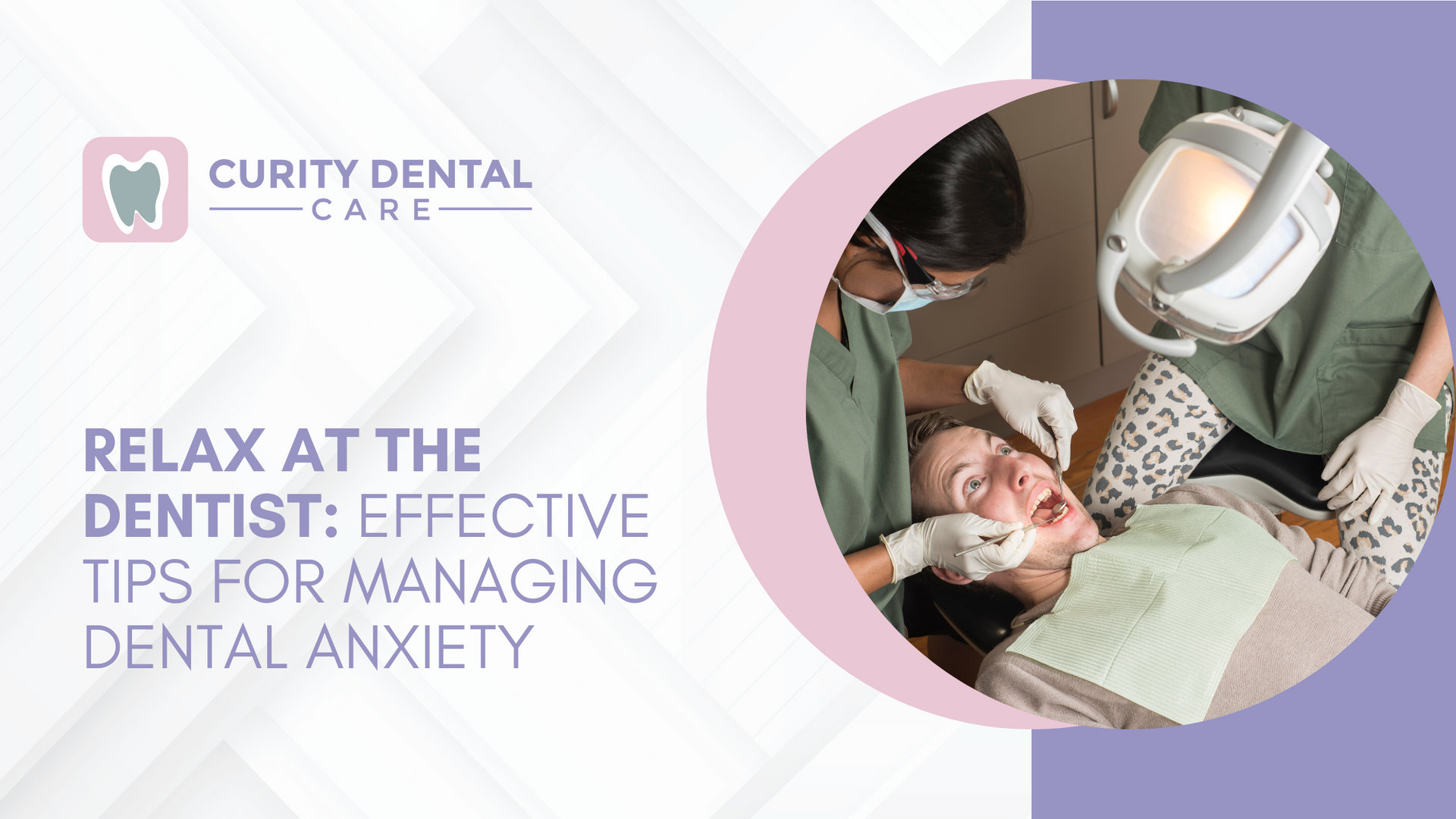Relax at the Dentist: Effective Tips for Managing Dental Anxiety

Source: Dr. Marketing
Dental anxiety is a common challenge that many people face, often leading to postponed or missed appointments and, ultimately, to neglected oral health. At Curity Dental Care in East York, we understand how overwhelming dental anxiety can be. If you find yourself dreading dental visits or feeling anxious about sitting in the dentist's chair, know that you are not alone. Unfortunately, avoiding the dentist due to anxiety can have serious consequences for your oral health. Delaying routine dental care often results in the progression of dental issues that could have been easily addressed if caught early. This avoidance can lead to more complex and costly treatments, such as root canals, dental crowns, or even dental implants, to replace teeth lost to decay or gum disease.
Understanding Dental Anxiety

Dental anxiety can manifest in various forms, from mild unease to intense fear, often referred to as dental phobia. It may stem from different sources, such as a past negative experience, fear of pain, or general discomfort with the clinical setting. The fear of the dentist can become so overwhelming that it leads to the complete avoidance of necessary dental care, further exacerbating oral health issues. Acknowledging and addressing this anxiety is crucial, as avoiding the dentist can lead to more serious dental problems down the line, requiring more invasive and expensive treatments. At Broomfield Smiles, we prioritize patient comfort and are dedicated to helping you overcome your dental fears.
Sedation Dentistry as a Solution

For those with significant dental anxiety or dental phobia, sedation dentistry offers a safe and effective way to undergo necessary procedures without the accompanying stress. Sedation can range from minimal levels, such as nitrous oxide (commonly known as laughing gas), which helps you relax while remaining fully conscious, to more profound levels like general anesthesia, where you are fully unconscious during the procedure. The level of sedation used depends on the severity of your anxiety and the type of dental work being performed. By discussing your concerns with our dentist, Dr. Magder, you can explore whether sedation dentistry is an appropriate option for you, allowing you to receive the care you need in a more relaxed state.
Relaxation Techniques to Manage Anxiety

Even if sedation isn’t necessary, there are numerous relaxation techniques that can help ease your dental anxiety or fear of the dentist. Deep breathing exercises, for example, can be very effective. By focusing on slow, deep breaths, you can calm your mind and reduce physical tension. Progressive muscle relaxation, another useful technique, involves tensing and then relaxing different muscle groups in your body, helping you release the physical manifestations of stress. Visualization, where you imagine yourself in a peaceful and calming place, can also shift your focus away from the dental procedure.
Listening to music or podcasts during your appointment can serve as a pleasant distraction, helping you to tune out the sounds of dental instruments. Many dental offices are equipped with TVs or offer headphones to make your experience more comfortable. Additionally, communicating openly with your dentist about your anxiety can make a significant difference. A good dentist will be understanding and may offer to explain each step of the procedure, provide additional numbing agents, or take breaks during the appointment to ensure your comfort.
What to Expect During a Dental Visit

Understanding what happens during a typical dental visit can also alleviate some of the anxiety. When you arrive at the dental office, you’ll check in and wait briefly in the reception area. If you’re feeling particularly anxious, it’s a good idea to inform the staff—they’re there to help and may be able to accommodate your needs to make you feel more at ease. During the initial examination, the dentist or hygienist will assess your teeth and gums, sometimes taking X-rays to get a comprehensive view of your oral health. If it’s a routine cleaning, the hygienist will remove plaque and tartar from your teeth and then polish them to remove surface stains. This process is generally painless, although some patients may experience minor discomfort, especially if they have sensitive teeth or gums.
If any dental issues are identified, your dentist will discuss them with you and outline a treatment plan. Knowing this in advance helps you mentally prepare for any further procedures. Regular dental visits are key to maintaining oral health, and they allow your dentist to address any problems before they become more serious.
The Importance of Overcoming Dental Anxiety
Overcoming dental anxiety is essential not just for your immediate comfort, but also for preventing the need for more complex treatments in the future. Patients who avoid the dentist due to fear or anxiety often end up with advanced dental issues, such as severe decay, infections, or tooth loss. These conditions can lead to the need for extensive restorative treatments like dental implants, bridges, or dentures. By addressing your anxiety early on, you can maintain your oral health and avoid the physical, emotional, and financial burdens associated with complex dental procedures.
When to Seek Professional Help

In some cases, dental anxiety can be so severe that it significantly interferes with your ability to receive necessary care. If this is the case for you, seeking help from a mental health professional could be beneficial. Cognitive-behavioral therapy (CBT) is particularly effective for treating dental anxiety, as it helps patients change the thought patterns that contribute to their fears. By working with a therapist, you can develop coping strategies that make it easier to face dental visits with confidence.
Taking Control of Your Dental Anxiety

Dental anxiety is a widespread issue, but it doesn’t have to prevent you from receiving the oral care you need. Whether through sedation dentistry, relaxation techniques, or professional help, there are multiple ways to manage your anxiety and ensure a positive experience at the dentist. By addressing your dental anxiety, you can avoid the need for more complex treatments down the road, keeping your smile healthy and beautiful. The team at Curity Dental Care in East York is committed to your comfort and well-being, and by taking proactive steps, you can overcome your fears and maintain a healthy, beautiful smile.
If you are ready to discuss your concerns or schedule a visit, don’t hesitate to contact our team at Curity Dental Care. We are here to support you every step of the way, providing a stress-free environment where your dental health is our top priority.



We are the local East York dentist near you!
Rediscover your confidence and your smile
Book Your Next Dental Appointment
We look forward to seeing you soon!
Please note, we will try our best to accommodate your schedule.
Thank you so much for contacting our dental clinic. While we strive to respond to all inquiries right away, we may be away from the desk helping a patient or out of the office. We will do our best to reach back to you shortly.
Please note, if this is an dental emergency, it would be best to call our clinic as this is the fastest way to reach us (416) 755-0151.
Please try again later
East York Dentist
We understand that trying to find a nearby dentist you can trust is difficult, that is why we make it easy for you to work with us.
(416) 755-0151
947 O'Connor Dr
Helpful Links
Dental Clinic Hours
- Monday
- -
- Tuesday
- -
- Wednesday
- -
- Thursday
- -
- Friday
- -
- Saturday
- Closed
- Sunday
- Appointment Only
All Rights Reserved | Curity Dental Care
All Rights Reserved | Curity Dental Care
Dentist Website Diagnosed, Treated, and Cured by Dr. Marketing Inc
